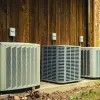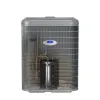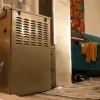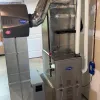It’s official! Air conditioner and heat pump manufacturers are rolling out new refrigerants to comply with EPA guidelines.
Starting in January 2025, no new HVAC systems will use R-410A refrigerant. Instead, most residential systems will use either R-32 or R-454B refrigerant, both of which have a comparably lower environmental impact.
Some manufacturers have already started shipping systems that use the new types of refrigerant and may stop using R-410A entirely before the end of 2024.
What does this change mean for you, the homeowner? Let’s take a look at a few potential impacts the R-410A phaseout might have.
If you’re planning to replace your AC in the near future…
Then you might want to do so before 2025!
At the time of writing (summer 2024), it’s still possible to purchase systems that use R-410A refrigerant. The systems available today are less expensive than the systems that will be available to homeowners in 2025 and beyond.
Why will the new systems cost more? Well, it’s because the new refrigerants, R-32 and R454B, are different from R-410A.
Both new types of refrigerant are mildly flammable. Because they reside within a closed system and aren’t exposed to ignition sources, they don’t pose any likely danger to homeowners. However, flammable is flammable. HVAC manufacturers have equipped all systems using these refrigerants with additional safety sensors to mitigate the tiny additional risk their flammability imposes.
Adding those sensors is kind of like adding a feature to the system itself. And more features cost more money.
That being the case, you might save a great deal by replacing an AC that uses R-410A (the old type of refrigerant) before 2025.
Will getting an R-32 or R-454B system “future-proof” your AC?
Sort of, but not really.
The thing about the R-410A refrigerant phaseout is that R-410A isn’t actually going away any time soon.
If you’ve purchased a heat pump or air conditioning system any time since 2010, that system almost certainly uses R-410A refrigerant. Many systems purchased prior to 2010 also use it.
Before R-410A became the dominant type of refrigerant, air conditioning systems used R-22, aka Freon. Due to concerns about the HCFCs present in that refrigerant and their impact on the earth’s ozone layer, the EPA mandated a phaseout of R-22 that culminated in all new HVAC equipment using R-410A beginning in 2010.
The EPA is mandating a phaseout of R-410A for essentially the same reason. It’s not nearly as bad for the ozone as R-22 was. But it’s still not great. Also, R-410A operates at higher pressures than R-22. As such, it is more prone to leaking and contributing to ozone depletion.
Anyway, the thing to keep in mind is that R-22 was still readily available even after the EPA prohibited its use in new equipment. It was only after 2020 that it became illegal to manufacture or import R-22 refrigerant. R-410A will be phased out in much the same way.
Since so many systems use R-410A refrigerant, it’s not going anywhere. We’ll have R-410A on hand for many years to come and will easily be able to service HVAC systems that use it.
Some people might be inclined to replace their existing system with one that uses R-32 or R-454B refrigerant in an effort to totally future-proof their AC or just make a greener purchase. That’s totally fine!
Just keep in mind that R-410A is still readily available and will be for the foreseeable future. New systems won’t use it, but it remains the most common type of refrigerant in use today for residential HVAC systems.
Conclusion: You could save money by replacing your system prior to the new refrigerant rollout in 2025
Because ACs and heat pumps that use the new R-32 and R-454B refrigerants require additional safety sensors, they will cost more than systems that use R-410A refrigerant. If you’re already planning to replace your system and want to save some money, it’s a good idea to purchase a new air conditioner during the remaining months between now and January 1, 2025.
If you live in the Atlanta Metro area and are ready to replace your AC or just have questions about the new refrigerant types, get in touch with us! We’re happy to answer your questions and help you make the best decision for your home.
Simply fill out the form below, or call PV at (470) 231-0076 today!






